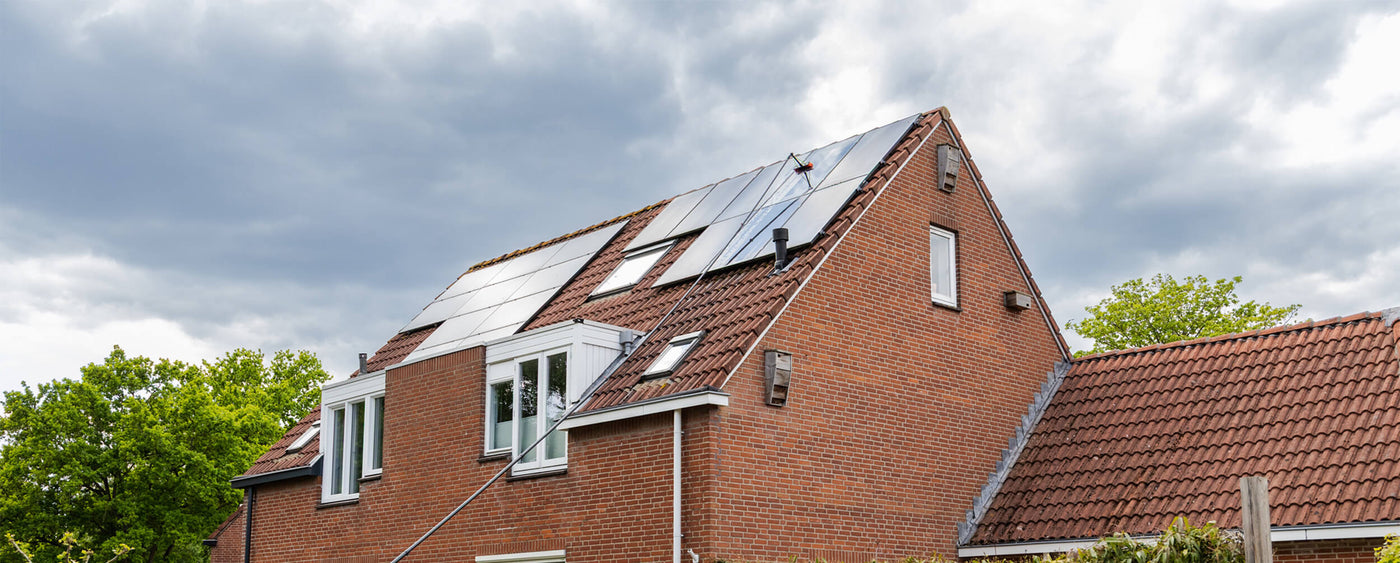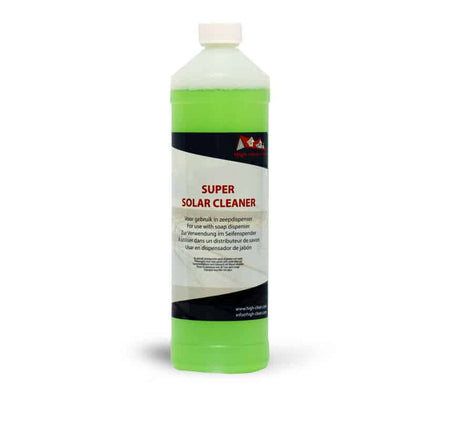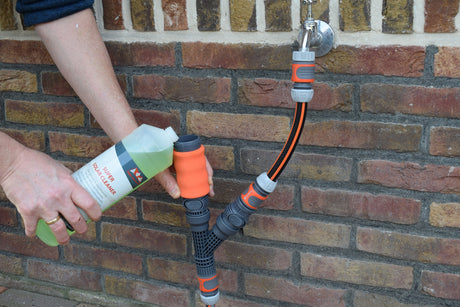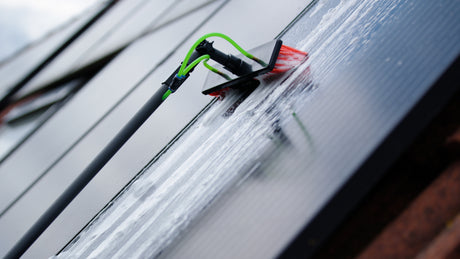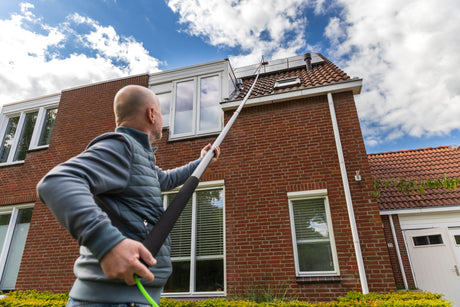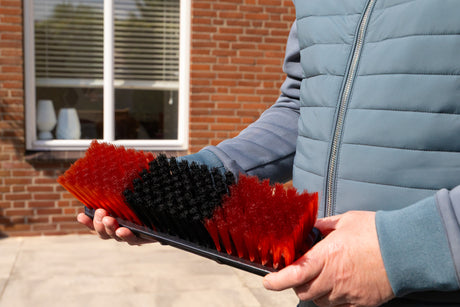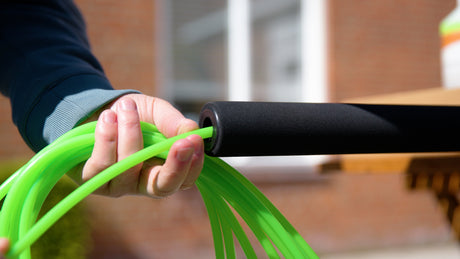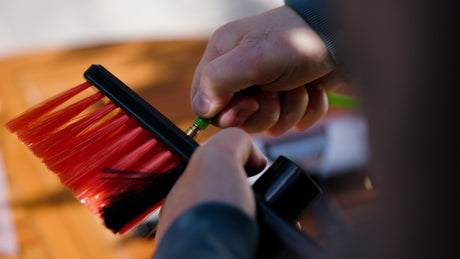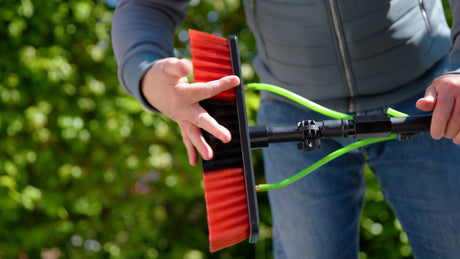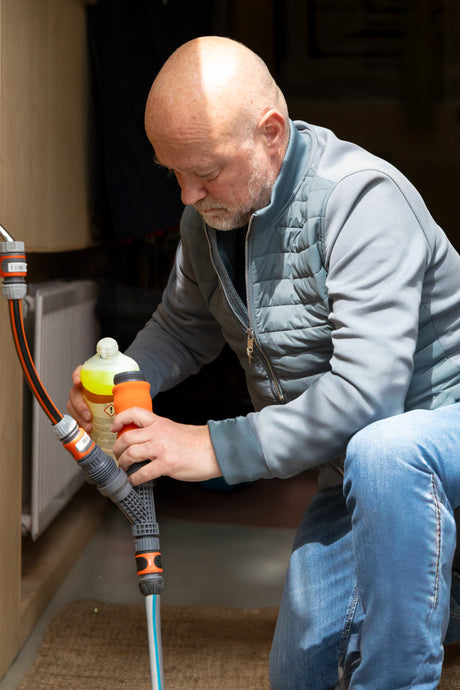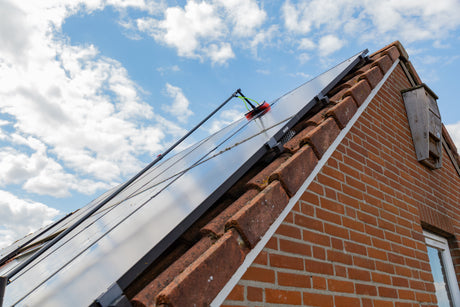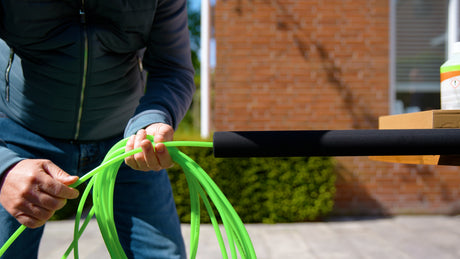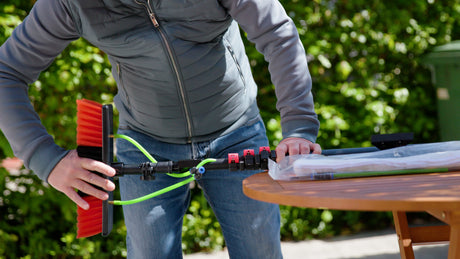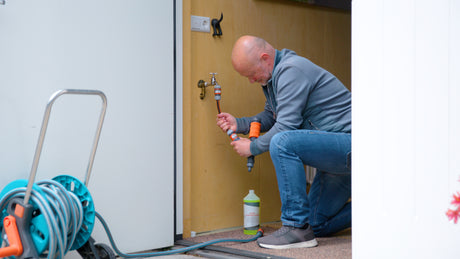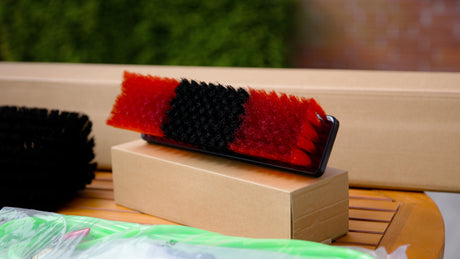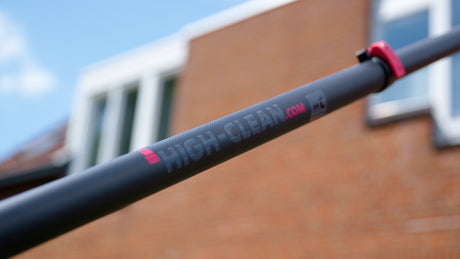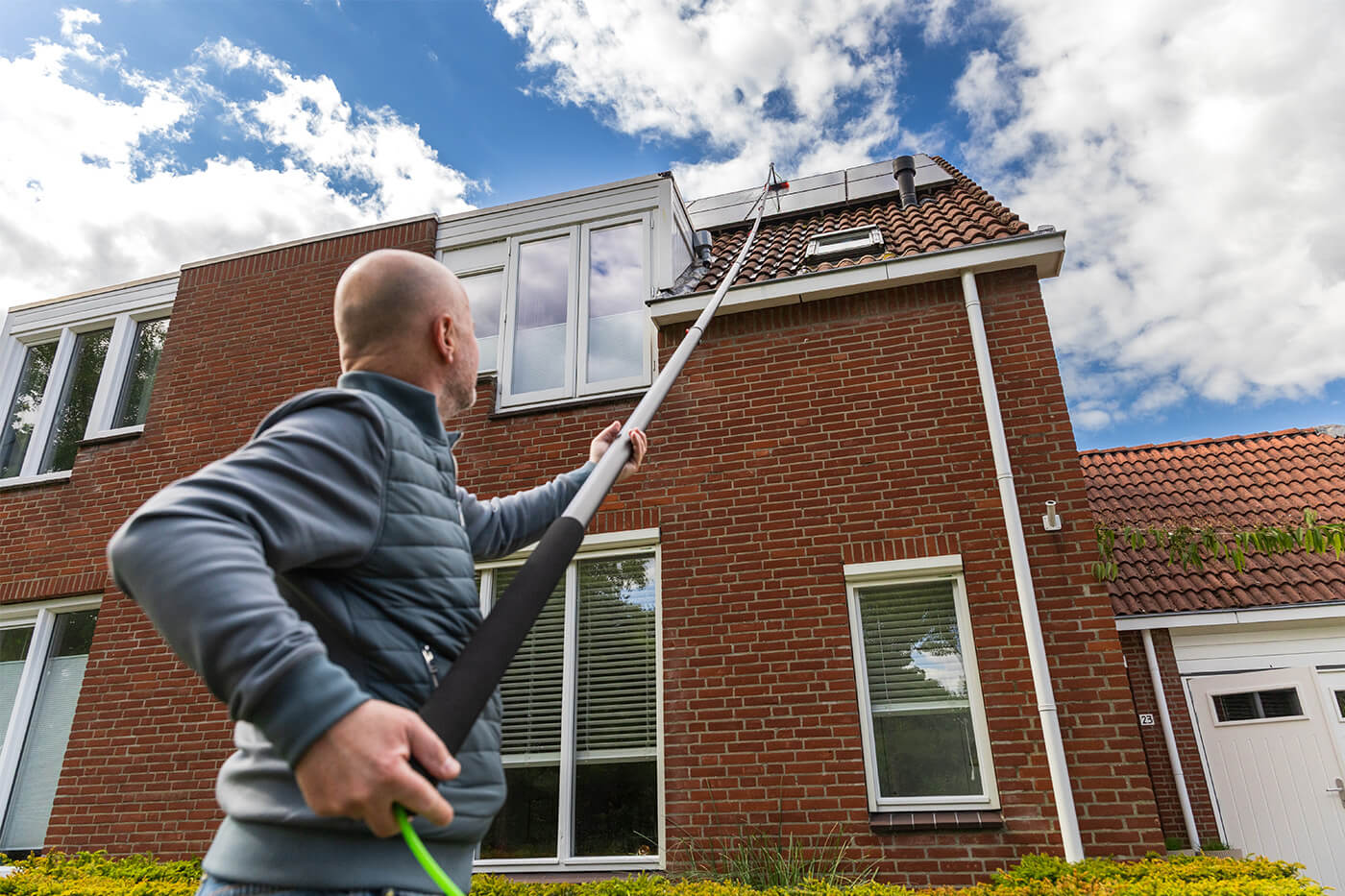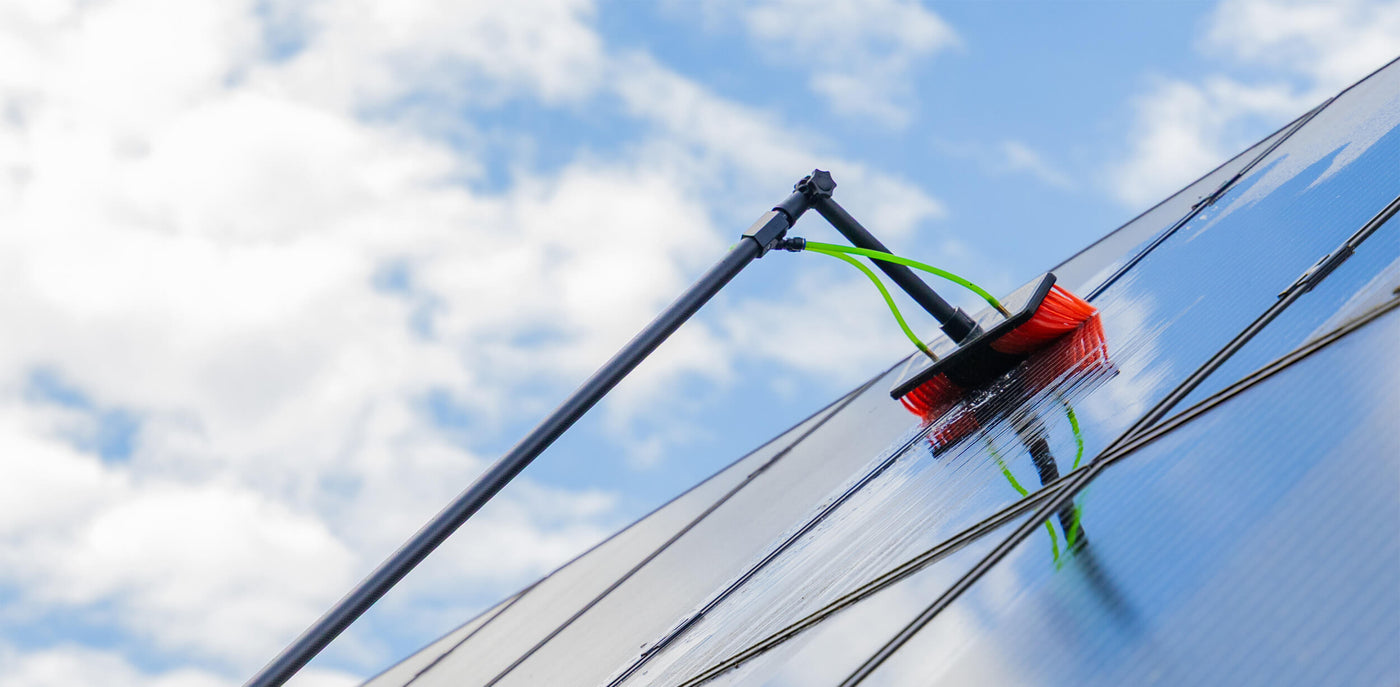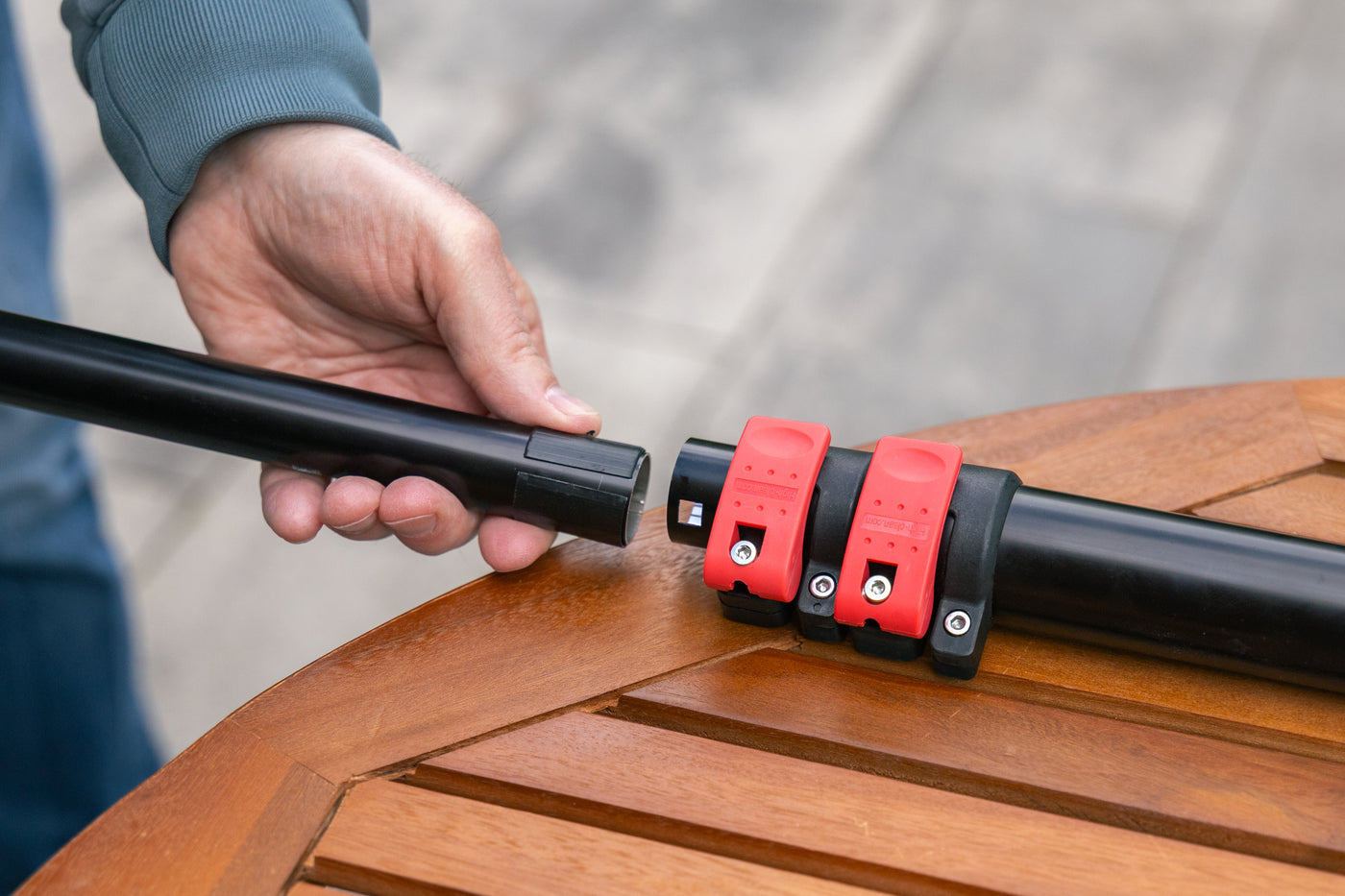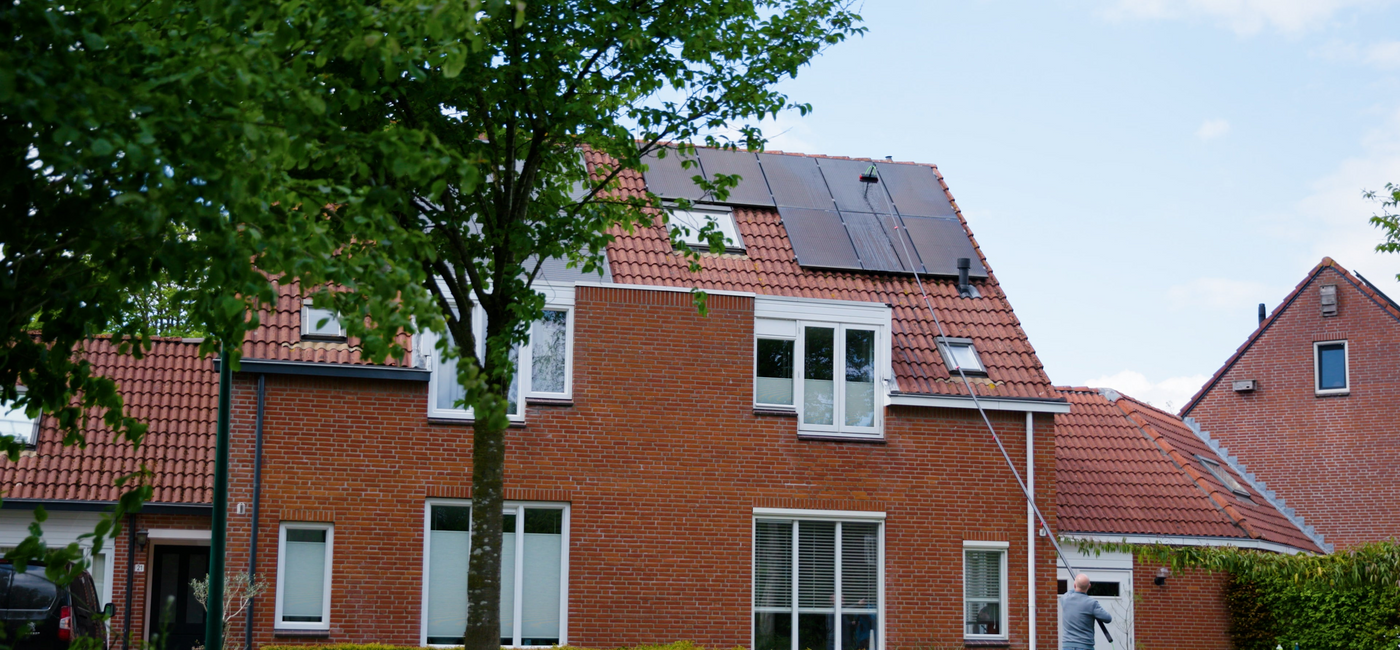
Why clean?
Solar panels work by capturing sunlight and transferring it to the solar cells. Stained solar panels capture less sunlight, producing less solar energy. Fallen leaves, bird droppings, pollen and dust are the main causes of solar panels becoming dirty. By cleaning your solar panels regularly, you get the maximum performance out of your solar panels.
Telescopic poles for cleaning solar panels

Should I clean my solar panels if there is sand on them?
Cleaning solar panels when there is sand on them is not always necessary. The next rain shower will often ensure that the solar panels perform optimally again. Only if no rain is forecast for the coming days/weeks can it be beneficial to clean your solar panels. During longer periods of drought, we also always recommend keeping them clean to avoid losing efficiency.
Is there more dirt than just sand on your solar panels? Then it is also advisable to clean the solar panels.

How do you clean solar panels with Sahara sand?
Cleaning solar panels with Sahara sand requires a careful approach to prevent scratches and damage. Always use a telescopic pole with a soft brush to safely remove the sand without damaging the surface. Our telescopic poles can also be easily connected to your garden hose, making it easy to wash the dirt and sand from your solar panels.
- First rinse the panels thoroughly with water (preferably osmosis water that is free of lime) to loosen the sand
- Then use a soft brush to carefully remove dirt residues.
- Avoid aggressive cleaning agents or high-pressure cleaners, as these can damage the protective layer of the panels.
- With High-Clean cleaning products you can keep your solar panels clean and maintain maximum energy yield!
Telescopic poles for cleaning solar panels
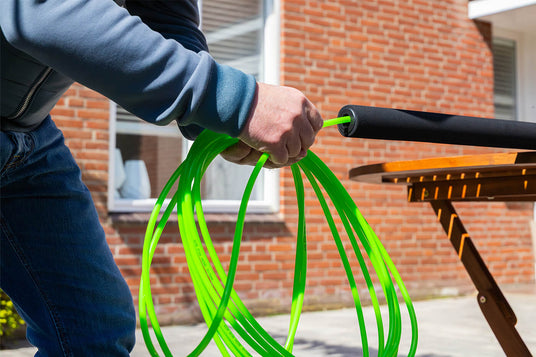
Cleaning solar panels yourself
You can easily clean solar panels yourself with the right tools: a telescopic extension pole and telescopic brush. Doing it yourself means you don’t have to hire a cleaning company, which saves you a lot of money.

Example:
Hiring a professional cleaning company will easily cost a time. You can buy a telescopic pole ranging from . This allows you to clean your solar panels for years to come. So if you use a cleaning company twice, it already costs you a lot more than if you buy a telescopic pole yourself.
Telescopic poles for cleaning solar panels

When to Wash
It’s best to clean your solar panels in April. This way you are prepared for the six sunniest months of the year and get the most out of your solar panels. In the autumn period, make sure that you regularly check your solar panels for loose leaves. The leaves block the sunlight, reducing the efficiency of your panels. Also, in the winter period, it pays to check your solar panels: just like leaves, snow can block out the sunlight and negatively impact the performance.

Optimal efficiency
With traditional solar panels without Optimizers, the weakest solar panel has a major impact on the performance of the other panels. Even if one panel contains bird droppings or other stains, it reduces the performance of the other panels. By regularly cleaning and removing the dirt, you avoid a drop in performance of your panels.
Telescopic poles for cleaning solar panels

Cleaning solar panels: useful tools
If you plan to clean your solar panels yourself, you’re going to need tools. The two most important tools are:
Solar panels are usually located on the roof, so the recommended option is to choose an extendable telescopic pole. This allows you to reach any part of the roof, while standing at ground level. Telescopic cleaning poles are available in different sizes and types. Always choose an extension that matches the height you need to reach. All our telescopic poles are sold as a complete set, including telescopic brush, high-power water hose and angle adapter. Telescopic brushes are also sold separately and are often sold with a window cleaner set for washing high windows.

Cleaning tips for cleaning solar panels
- Check your solar panels 2 to 3 times a year.
- Working safely: switch off your power system and do not touch the wiring.
- Get rid of hard-to-remove stains: First remove dry leaves and then remove stubborn stains with a cloth or soft brush.
- Use an extendable telescope.
Telescopic poles for cleaning solar panels
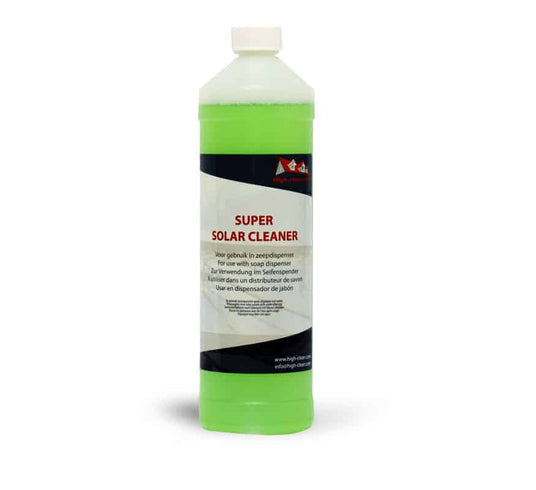
Our tip
Our advice is to clean your solar panels when it rains. The rainwater loosens the dirt, which makes cleaning your solar panels easy. Rainwater is lime-free and rinses your solar panels completely, without leaving any streaks. This means that you don’t have to buy an expensive osmosis system. For solar panels, use Super Solar Cleaner, which must be rinsed thoroughly with water after use so that no soap residue remains on your panels.
Caution: Do not use a high-pressure sprayer: this will damage the solar panels.

Why clean solar panels?
Suppliers and manufacturers of solar panels often indicate that solar panels are self-cleaning. But over time, panels can still gather dirt. Cleaning the solar panels is a smart thing to do. A haze of dust/sand, bird droppings, and possibly materials resulting from carbon emissions from nearby industrial centres, can all have a negative impact on the system’s performance, along with the return on your investment, which would be a waste. It is difficult to measure the effect this has in terms of efficiency, as dirt buildup increases very gradually. Due to a variety of different influences floating around in the open air outdoors, such as fine dust, desert sand, bird droppings and even acid rain, solar panels always build up a layer of dirt. Obviously, this has a direct effect on the power of the sun’s rays reaching the solar cells. Research has shown that cleaning your solar panels regularly ensures that the sun’s rays work better on the system and increase efficiency. Dirty solar panels can lead to a decline in performance of up to 20%. Often, the cleaning of the solar panels is neglected and the owners fail to notice the diminishing performance. A drop in performance is often put down to there simply being less sunshine, while some of the solar energy isn’t even reaching the solar collectors. The efficiency of solar panels can easily fall by 20% due to dirt buildup.

Tips for cleaning your solar panels
To give you a hand, here are some useful tips for cleaning your solar panels:
- Check regularly – Inspect the solar panels regularly, about two to three times a year. This way you can be sure that they stay clean.
- Work safely – Switch off the installation completely before starting cleaning. And do not touch the wiring, to make sure you work safely.
- Leaves – Remove all dry parts before working with water
- Wet – First spray the dirt thoroughly with water using the telescopic pole, let the water soak in for a few minutes and then start cleaning with the brush. The dirt will come right off.
- Cloudy days – Clean the solar panels at a time when there is less sunlight, for example on cloudy days, early in the morning or late in the evening. This prevents the cleaning water from drying up too quickly and leaving behind stains or residue.
- Check the temperature – Make sure the solar panels are at a normal temperature. The temperature can reach up to 80 degrees Celsius and if you use cold water, the glass may crack. This can also be dangerous for you.
- Allow to dry – Do not dry the solar panels, as this may cause abrasion and scratches.
- Keep the brush clean – Keep the brush(es) in optimal condition by rinsing thoroughly in hot water regularly. This keeps the bristles in their original shape, and removes any remaining dirt from the brush.
